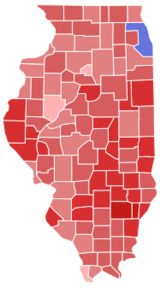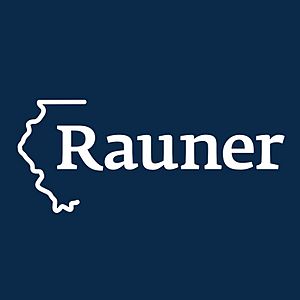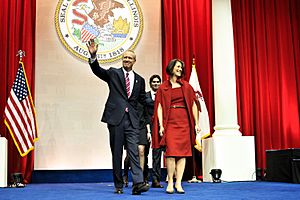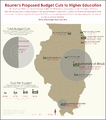Bruce Rauner facts for kids
Quick facts for kids
Bruce Rauner
|
|
|---|---|
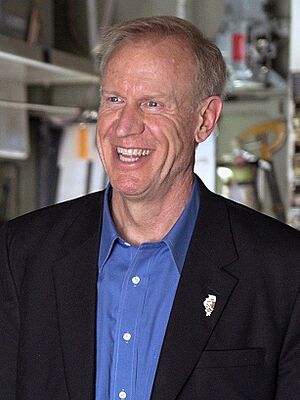
Rauner in 2016
|
|
| 42nd Governor of Illinois | |
| In office January 12, 2015 – January 14, 2019 |
|
| Lieutenant | Evelyn Sanguinetti |
| Preceded by | Pat Quinn |
| Succeeded by | JB Pritzker |
| Personal details | |
| Born |
Bruce Vincent Rauner
February 18, 1956 Chicago, Illinois, U.S. |
| Political party | Republican |
| Spouses |
Elizabeth Wessel
(m. 1980; div. 1993)Diana Mendley
(m. 1994) |
| Children | 6 |
| Education | Dartmouth College (BA) Harvard University (MBA) |
| Signature | |
Bruce Vincent Rauner (born February 18, 1956) is an American businessman and politician. He served as the 42nd governor of Illinois from 2015 to 2019. Before entering politics, Rauner was a successful businessman for many years. He was a co-founder of the Chicago-based investment company GTCR.
Rauner, a member of the Republican Party, decided to get involved in politics after retiring from his company in 2012. He ran for governor of Illinois in 2014 and won against the governor at the time, Pat Quinn.
As governor, Rauner had a mix of moderate and liberal Republican views. He wanted to lower some taxes and create term limits for politicians. However, he faced challenges because the Illinois General Assembly (the state's legislature) was controlled by the Democratic Party. This led to a major disagreement over the state's budget that lasted for two years.
When he ran for re-election in 2018, he lost to the Democratic candidate, JB Pritzker.
Contents
Early Life and School
Bruce Rauner was born in Chicago and grew up in Deerfield, Illinois, a nearby suburb. His mother, Ann, was a nurse, and his father, Vincent, was a lawyer for Motorola. He has three siblings. His first job was delivering newspapers.
Rauner did very well in school. He graduated with the highest honors from Dartmouth College with a degree in economics. He later earned a Master of Business Administration (MBA) degree from Harvard University.
Business and Charity Work
For over 30 years, Rauner worked at the investment company GTCR, which he helped start. He became the chairman of the company before retiring in 2012.
Rauner has also been involved in charity work. He has given money to many important projects. These include Chicago's Red Cross headquarters, the YMCA in the Little Village neighborhood, and new charter schools. He also supported scholarship programs for students and helped build the Rauner Special Collections Library at Dartmouth College.
For his charity work, he won the 2008 Distinguished Philanthropist award from the Chicago Association of Fundraising Professionals.
2014 Election for Governor
In 2013, Rauner announced he was running for governor of Illinois. He said he wanted to make the government work better, improve schools, and help businesses in the state. He also supported term limits, which would limit how long politicians can stay in office. He promised to serve no more than two terms as governor.
Rauner won the Republican primary election, beating three other candidates. In the main election, he faced Governor Pat Quinn. Rauner won with just over 50% of the vote. He won in every county in Illinois except for Cook County, where Chicago is located.
Governor of Illinois (2015-2019)
Rauner became the 42nd governor of Illinois on January 12, 2015. His time as governor was marked by major disagreements with the Democratic-controlled state legislature.
The State Budget
One of the biggest challenges of Rauner's term was the Illinois Budget Impasse. Rauner and the legislature could not agree on a state budget for two years. Rauner wanted to cut spending, while Democratic leaders wanted to raise taxes to pay for state services.
Without a budget, many government services were affected. Social service groups had to cut back, state universities laid off workers, and funding for many programs was stopped. In 2016, a temporary budget was passed to keep schools and essential services running. Finally, in 2017, the legislature passed a budget with a tax increase. Rauner rejected it, but the legislature had enough votes to override his veto and make it law.
Education Funding
Rauner made it a priority to increase funding for schools. During his term, funding for K-12 education went up by nearly $1 billion. In 2017, he signed a new law that changed how Illinois funds its schools. The new system, called an "evidence-based model," sends more money to the school districts that need it most. This new law was praised by many newspapers and organizations.
Social Issues
Rauner had moderate-to-liberal views on many social issues.
- LGBT Rights: Rauner supported same-sex marriage. He signed a law that banned conversion therapy for minors. He also made it easier for transgender people to change their birth certificates. He even marched in LGBT pride parades and led the wedding ceremony for a same-sex couple.
- Immigration: In 2017, he signed a law that prevented local police from arresting people just because of their immigration status. This made Illinois a "sanctuary state."
2018 Re-election Campaign
Rauner ran for a second term in 2018. He narrowly won the Republican primary election against a more conservative opponent, Jeanne Ives.
In the general election, he faced Democratic candidate JB Pritzker. Rauner lost the election, receiving 39% of the vote compared to Pritzker's 55%. It was one of the biggest losses for a sitting governor in Illinois history.
Personal Life
Before becoming governor, Rauner lived in Winnetka, Illinois, with his wife, Diana, and their three children. He also has three children from his first marriage. While he was governor, the family lived in the Illinois Governor's Mansion in Springfield.
Rauner is very wealthy, with a net worth estimated to be several hundred million dollars. When he was governor, he promised to take a salary of only $1 per year. After losing the 2018 election, Rauner moved to Florida.
Electoral history
| Party | Candidate | Votes | % | |
|---|---|---|---|---|
| Republican | Bruce Rauner | 328,934 | 40.13 | |
| Republican | Kirk W. Dillard | 305,120 | 37.22 | |
| Republican | Bill Brady | 123,708 | 15.09 | |
| Republican | Dan Rutherford | 61,948 | 7.56 | |
| Total votes | 819,710 | 100.0 | ||
| Party | Candidate | Votes | % | |
|---|---|---|---|---|
| Republican | Bruce Rauner (Evelyn Sanguinetti) | 1,823,627 | 50.27 | |
| Democratic | Pat Quinn (incumbent) (Paul Vallas) | 1,681,343 | 46.35 | |
| Libertarian | Chad Grimm (Alex Cummings) | 121,534 | 3.35 | |
| Write-in | 1,186 | 0.03 | ||
| Total votes | 3,627,690 | 100.0 | ||
| Party | Candidate | Votes | % | |
|---|---|---|---|---|
| Republican | Bruce Rauner (incumbent) | 372,124 | 51.53 | |
| Republican | Jeanne Ives | 350,038 | 48.47 | |
| Total votes | 722,162 | 100.0 | ||
| Party | Candidate | Votes | % | |
|---|---|---|---|---|
| Democratic | JB Pritzker (Julianna Stratton) | 2,479,746 | 54.53 | |
| Republican | Bruce Rauner (Evelyn Sanguinetti) (incumbent) | 1,765,751 | 38.83 | |
| Conservative | William "Sam" McCann (Aaron Mereighn) | 192,557 | 4.23 | |
| Libertarian | Grayson Kash Jackson (Sanj Mohip) | 109,518 | 2.41 | |
| Write-in | 115 | 0.00 | ||
| Total votes | 4,547,657 | 100.0 | ||
Images for kids
See also
 In Spanish: Bruce Rauner para niños
In Spanish: Bruce Rauner para niños
 | Chris Smalls |
 | Fred Hampton |
 | Ralph Abernathy |


